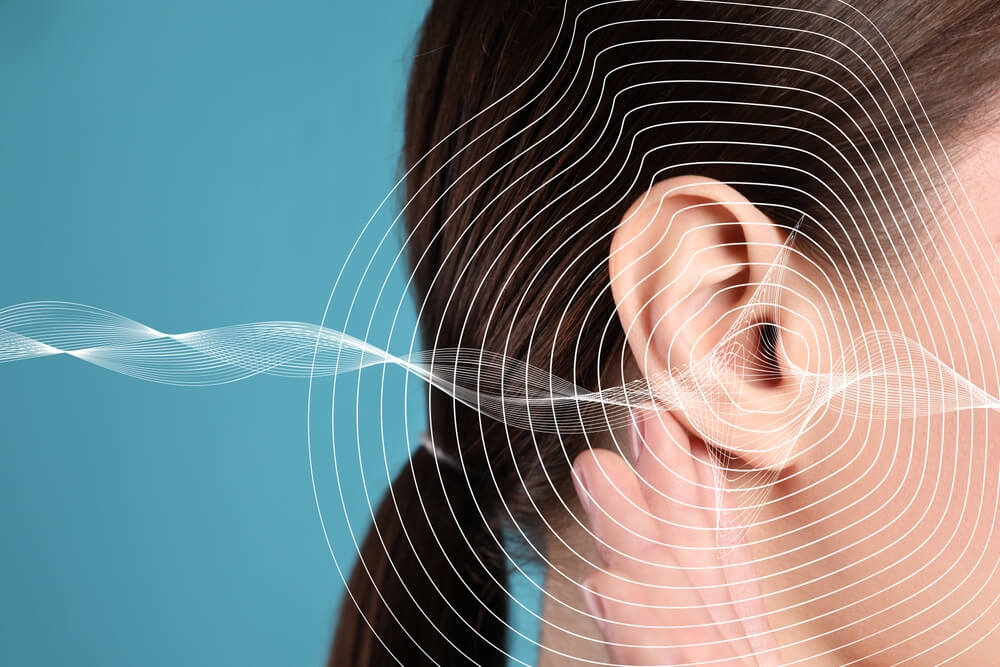
Conductive vs. Sudden Sensorineural Hearing Loss


Imagine the world suddenly growing quieter, the voices of loved ones fading into a distant hum. Hearing loss can be a profound and isolating experience, affecting not only your ability to communicate but also your overall quality of life.
At Aviv Clinics, we understand the challenges you may be facing and are committed to helping you regain your hearing. Our team has experience treating hearing loss clients, so we’re here to share our knowledge on conductive vs. sensorineural hearing loss. This includes sudden sensorineural hearing loss along with helpful details on mixed hearing loss.
Our goal is to empower you with knowledge and support so you can take control of your hearing journey and live life to the fullest.

What Is Conductive Hearing Loss?
Conductive hearing loss occurs when a problem with the outer or middle ear affects the transmission of sound waves to the inner ear.
Causes of Conductive Hearing Loss
This condition can be caused by:
- Earwax buildup: Excess earwax can block the ear canal, preventing sound waves from reaching the eardrum.
- Fluid buildup: Fluid buildup in the middle ear, often due to allergies or colds, can impair hearing.
- Ear infections: Infections of the outer or middle ear can cause inflammation and fluid buildup, affecting hearing.
- Damage to the eardrum: Perforations or tears in the eardrum can interfere with sound transmission.
- Otosclerosis: This hereditary bone disorder can affect the structure of the middle ear and interfere with hearing.
Symptoms of Conductive Hearing Loss
Those who have conductive hearing loss often experience:
- Muffled or quieter sound perception
- Difficulty hearing soft sounds
Depending on the cause of the problem, you might also experience pain or a sense of fullness in your ear, dizziness, or ear drainage.
Treatment Options for Conductive Hearing Loss
Treatment options depend on the cause and symptoms of your conductive hearing loss, but they might entail:
- Medications (such as antibiotics)
- Hearing aids
- Surgery
- Balance therapy
What Is Sensorineural Hearing Loss?
Sensorineural hearing loss is a type of hearing loss that occurs because of damage to the auditory nerve or the inner ear. There are two types of sensorineural hearing loss: traditional and sudden.
Traditional sensorineural hearing loss is the most common type of permanent hearing loss and is typically not treatable. It can happen gradually due to aging or frequent exposure to loud noises.
Sudden sensorineural hearing loss (SSHL), also known as sudden deafness, is a rapid loss of hearing, usually in one ear. SSHL is a time-sensitive condition; therefore, early intervention is key. Fortunately, treatment options for SSHL exist.
Causes of Sudden Sensorineural Hearing Loss
In most cases, the cause of sudden sensorineural hearing loss is unknown—90% of SSHL cases are idiopathic. However, some common sudden sensorineural deafness causes are linked to:
- Viral infections: They can affect the inner ear and lead to hearing loss.
- Neurological disorders: For example, multiple sclerosis can contribute to SSHL development.
- Issues with blood circulation due to cardiovascular conditions: These can sometimes cause SSHL.
- Inflammation in the inner ear: It may lead to hearing loss.
Symptoms of Sudden Sensorineural Hearing Loss
Some people with SSHL experience have trouble hearing specific frequencies or in noisy environments. Others can experience an abrupt and complete loss of hearing. Permanent hearing loss can occur if early intervention is not taken, particularly within two weeks.
Other symptoms can include:
- The sensation of having a blocked ear
- Ringing or buzzing in the ear (tinnitus)
- Dizziness or vertigo
Treatment Options for Sudden Sensorineural Hearing Loss
Common treatment options for SSHL include intratympanic steroid injections. Steroids “usually work by reducing inflammation, decreasing swelling, and helping the body fight illness.”
Health researchers note steroids should be administered “as soon as possible for the best effect,” and delaying treatment for “more than two to four weeks is less likely to reverse or reduce permanent hearing loss.”
Recently, scientific discoveries have also uncovered that hyperbaric oxygen therapy (HBOT) encourages blood flow and tissue oxygenation in the inner ear, which promotes healing:
- Based on clinical studies, researchers recommend HBOT “combined with steroids … for patients with SSHL.”
- HBOT can be an “effective treatment for [SSHL] with fewer side effects” compared to other therapies.
- Individuals who receive HBOT “within three days of symptoms onset” (instead of steroids) report significant improvements in their idiopathic SSHL condition.
At Aviv Clinics, we prioritize client comfort and safety during our hyperbaric oxygen therapy sessions. Our spacious multi-person suites comfortably accommodate up to 14 individuals, and a dedicated medical staff member is always present to ensure your well-being. Our unique HBOT protocol enhances the treatment by fluctuating oxygen levels, promoting the body’s natural rejuvenation process.
Key Differences Between Conductive and Sudden Sensorineural Deafness And Mixed Hearing Loss
Because there is some overlap between conductive and sudden sensorineural hearing loss, it helps to understand their key differences. This will help you better communicate your needs to your healthcare provider and make informed decisions about treatment options.
Four key factors differentiate conductive and sudden sensorineural hearing loss.
-
Location
- Conductive: Outer/middle ear
- Sudden and Traditional Sensorineural: Inner ear or auditory nerve
-
Cause of Hearing Loss
- Conductive: Earwax buildup, ear infections, fluid buildup, damage to the eardrum, or otosclerosis
- Sensorineural: Aging, injury, disease, medications, genetics, injury, exposure to loud noises, malformation of the inner ear
- Sudden Sensorineural: 90% of cases are unknown; however, the condition is often linked to viral infections, neurological disorders, inflammation, and blood circulation conditions
-
Symptoms
- Conductive: Reduction in sound level
- Sensorineural: May include muffled sounds, difficulty hearing certain frequencies or in certain environments, dizziness or balance problems, tinnitus or ringing in the ears, and in some cases, complete deafness in one or both ears
-
Treatment
- Conductive: Often reversible with conventional treatments like medication
- Sensorineural: Not treatable with surgery or medications; however hearing aids may be beneficial to compensate for lost hearing
- Sudden Sensorineural: The world’s most advanced HBOT program paired with intratympanic steroid injections
Mixed Hearing Loss
It’s also possible to develop mixed hearing loss, which occurs when both conductive and sensorineural hearing loss affect an individual. This means there’s a problem with both the outer or middle ear (conductive hearing loss) and the inner ear or auditory nerve (sensorineural hearing loss).
Causes of Mixed Hearing Loss
Mixed hearing loss results from one or multiple of the following:
- Age-related hearing loss: As we age, both conductive and sensorineural hearing loss can develop.
- Noise-induced hearing loss: Exposure to loud noise can damage the inner ear, leading to sensorineural hearing loss.
- Ear infections: Repeated ear infections can damage the middle ear, leading to conductive hearing loss.
- Ototoxic medications: Certain medications can damage the inner ear, causing sensorineural hearing loss.
Any of the factors that cause conductive or sudden sensorineural hearing loss can also contribute to the development of mixed hearing loss.
Symptoms of Mixed Hearing Loss
The symptoms of mixed hearing loss can vary depending on the severity of the conductive and sensorineural components.
Common symptoms include:
- Difficulty understanding speech, especially in noisy environments
- Reduced hearing sensitivity
- Tinnitus (ringing in the ears)
- Muffled hearing
Treatment for Mixed Hearing Loss
Treatment for mixed hearing loss depends on the specific causes and severity of the hearing loss. Due to its complexity, mixed hearing loss requires a tailored treatment approach. It could involve medical interventions or hearing aids for the conductive hearing loss component and an HBOT protocol, such as that offered by Aviv Clinic,s to improve the symptoms of SSHL.
It’s important to consult with a hearing healthcare professional to determine the best type of treatment for your needs.
Take the First Step with Aviv Clinics

If you have SSHL, there is hope for recovery, but early intervention is key. Learn more about how the world’s most advanced HBOT program may help restore your hearing. Our medical team is happy to discuss your needs and options.
Aviv Medical Program provides you with a unique opportunity to invest in your health while you age




